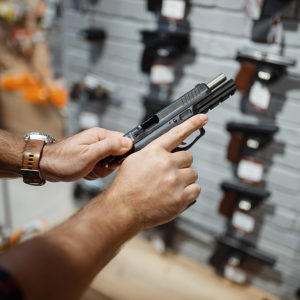Despite assurances from the sponsors of a proposed ‘Elder Abuse Protection’ bill, New Hampshire gun rights activists say the proposal will still lead to gun confiscation. It’s a familiar argument for a familiar bill — Governor Chris Sununu said he was “disappointed” when he vetoed virtually the same bill last year, in part citing concerns about second amendment infringements.
“It is incredibly disappointing that after two years of hard work, I have not yet received legislation to establish a protective order for vulnerable adults that the people of our State can support,” Sununu said in his veto message of last year’s bill, House Bill 1660.
A temporary order, Sununu said, without actual notice “and other provisions could lead to violations of an individual’s rights under the 2nd, 4th, 5th, and 14th Amendments to the United States Constitution, as well as similar provisions within the New Hampshire Constitution.”
NH House Democrats argue that will the bill is fundamentally unchanged, the already-overblown risk to gun rights is gone.
“Every reference to firearms, deadly weapons, or anything remotely like that have been totally removed from the bill,” Cheryl Steinberg, senior law project director at New Hampshire Legal Assistance testified on Wednesday. Steinberg is the primary author of the proposal, House Bill 246. Last year’s version was House Bill 1660.
“The issue now apparently is due process violations. They feel that the bill violates due process rights because there is the ability to issue orders without a full-blown evidentiary hearing,” said Steinberg.
Executive Councilor Dave Wheeler (R-Milford) said that there are deeper problems than that – pointing out that the bill only requires the lowest level of evidentiary proof and allows the use of evidence courts would normally reject, such as hearsay.
Wheeler also said that while the gun language is gone, the same confiscation mechanisms are still in the bill. The sixth-term Executive Councilor’s primary concern is that the bill, if passed, would allow these protective orders whether or not a crime or threat has occurred.
“Big brother is going to step in when nothing has happened, no crime has been committed, but something could happen. The bill is written so vaguely that you could accuse [children’s TV personality] Mr. Rogers of violating the proposal,” Wheeler told NHJournal. “They can throw you out of your house and take your firearms upon a preponderance of hearsay evidence without the right to confront your accuser or cross-examine witnesses or accusers.”
If a protective order is granted, the defendant’s name goes into a database with the State Police. That list is used by the Permits and Licensing Unit at the Department of Safety, commonly called the “gun line,” and precludes those people from purchasing or possessing firearms.
“Even if this had nothing to do with firearms, the whole procedure is wrong. Having some bureaucrat make a subjective decision about whether or not something may happen is unamerican,” Wheeler said.
But proponents say the bill is needed “now more than ever”, even if infringes on some rights.
“If the law errs on one side or another, I would hope that the law errs on the side of protecting the vulnerable adult and possibly overstepping on the rights of their abuser,” Lucy Weber (D-Walpole) told the committee.
“Why do our vulnerable adults not have at least as much protection as those who are abusing them,” Weber asked during an emotional four minutes of testimony. “That’s the purpose of this bill.”
This “new tool to protect vulnerable adults,” introduced by Rep. Cushing (D-Hampton), has been hotly contested in Concord since the idea’s inception, and a compromise has yet to be found on the measure.
Cushing acknowledged the bill “may be familiar” when he introduced it to the Health, Human Services, and Elderly Affairs Committee Tuesday. “New Hampshire has one of the fastest-growing aging populations in the country,” Cushing added, urging the committee to put “mechanisms in place to protect the most vulnerable members of our society.”
The eleven-page proposal would create a new chapter of law that opens a protective procedure for vulnerable adults, defined as adults with physical, mental, or emotional abilities that make them unable to manage their own affairs. Those adults don’t qualify under the domestic violence statute, proponents say, and therefore require the bill to allow them an avenue to defend themselves from abusers.
The New Hampshire Firearms Coalition, a staunch opponent of the bill, issued an “action alert” on Monday, urging its members to testify in opposition. If passed, they say, the bill “will violate many of your constitutional rights.
“In fact, it would allow police to show up at your house, unannounced, to confiscate your firearms,” wrote NHFC president Kirk Beswick.
“The first draft of the bill did include a provision to confiscate firearms,” Steinberg conceded. “The idea was that vulnerable adults should have the same protections as [domestic violence] victims.”
“We’re the second oldest state in the country and only getting older. Financial exploitation is a huge problem,” she told the committee, saying “billions of dollars are stolen annually from vulnerable adults.”
“I should also point out that the Governor’s veto message was not accurate,” Steinberg said, referencing concerns attributed to the New Hampshire Coalition Against Domestic & Sexual Violence in Sununu’s veto message. “That’s totally not true. This bill was a result of negotiations with the coalition.”
“Rather than exempting domestic violence victims from eligibility for this order to remove the possibility of confusion, as both I and the Coalition Against Domestic and Sexual Violence requested, the bill creates a “worksheet” for victims to fill out to determine if this order adequately addresses their situation. The last thing a victim of domestic violence needs to be dealing with as they are experiencing a traumatic situation is bureaucratic paperwork,” Sununu wrote in his veto message.
The hearing was recessed to February 8 to allow for more testimony.




